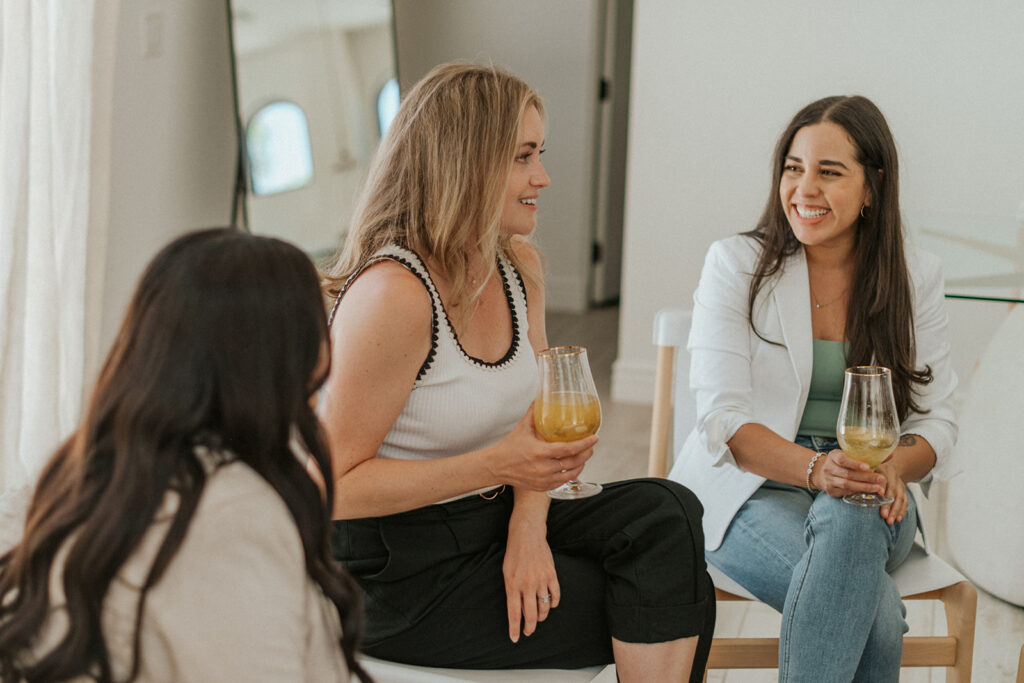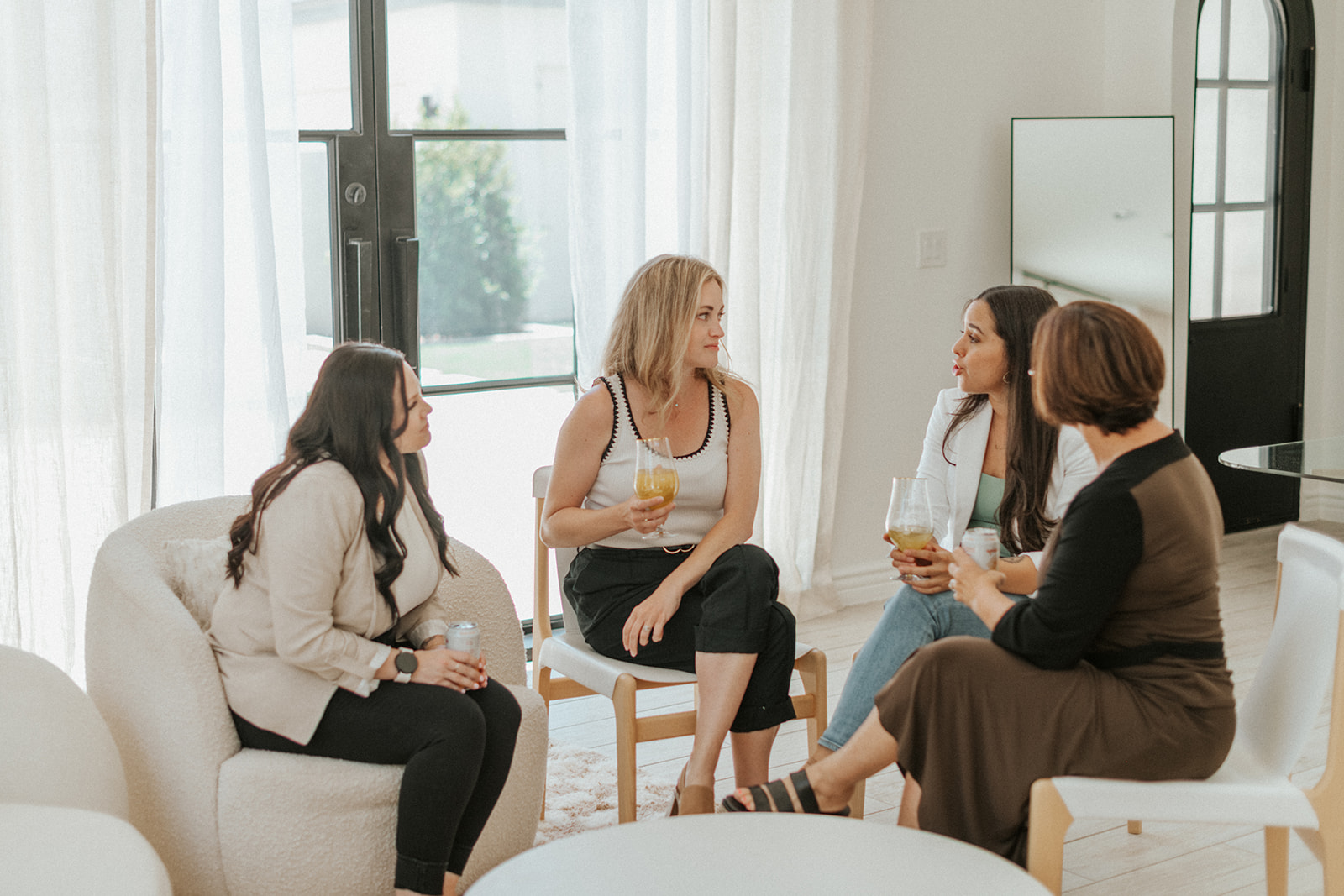If you’ve ever found yourself saying yes when every fiber of your being wanted to say no, you’re not alone. As a therapist I’ve sat with countless clients who share this same struggle. I’ve found that people who care deeply about others often neglect their own needs in the process. And while we might chalk it up to “being nice” or “wanting to avoid conflict,” I know things can be a bit more nuanced than that. People-pleasing can be deeply rooted in patterns that were learned at some point.
I know that claiming the title of being a “people-pleaser” can range from feeling functional for some to extremely distressing. Starting to understand the psychology of people-pleasing totally changes how you might approach working through it. Often it’s a coping mechanism shaped by early experiences, reinforced by social dynamics, and maintained by beliefs about self-worth, belonging, and safety. Let’s unpack what drives people-pleasing, the toll it can take on your mental health, and how to begin breaking the cycle without feeling like you’re turning into a selfish person.
Automatic YES
It feels automatic sometimes, doesn’t it? Suddenly you agree to take on extra work before you even realize what you’ve done. You might find yourself volunteering for a task in a group (not because you want to) because the silence feels uncomfortable. From a psychological perspective, people-pleasing often stems from the survival strategies our brains develop when we’re young. If your early environment rewarded compliance, helpfulness, or cheerfulness (and punished disagreement, anger, or independence) you learned to associate “being good” with safety and love. Over time we observe what is or isn’t allowed and the people-pleasing becomes automatic. Even as an adult your nervous system may still react as if saying “no” is dangerous.
The Role of Attachment
Attachment theory offers insight into why some people are more prone to people-pleasing than others. If you grew up in a household where love felt conditional then you might have learned that approval needed to be earned through meeting the needs of others before your own. Going out of your way to do the most might have created some relational safety between you and your primary caregivers.
For example, maybe you observed that when you received a positive report card that you were shown more love or nurturing. That’s something all humans (especially children) are wired for so it makes a whole lot of sense that your behavior might start to center around what allows you to receive emotional or physical safety.
The Biology of Saying Yes
Our brains are wired to seek connection. Some of the chemicals that are at play can have a lot to do with the feelings that come from saying yes. The release of oxytocin during positive interactions and the dopamine boost from being understood or valued are part of our wiring as humans. Over time our brains begin to anticipate these rewards which can make it easier to reinforce the yes-saying pattern. There’s a lot of good feelings in the body that can come from being the person who can always come through. Totally get that. BUT the short-term relief tends to override your own needs. You might start to experience burnout, resentment, and a sense of disconnection.
Signs You Might Be a People-Pleaser
Okay so it’s totally normal to want to be liked or valued. So how would you know if you had people-pleasing tendencies? There’s a few signs that stick out:
- Difficulty saying no (even to unreasonable requests)
- Apologizing frequently
- Avoiding conflict
- Taking responsibility for other people’s feelings
- Feeling guilty when prioritizing your needs
- Saying yes to avoid disappointing others (even when it creates distress for you)
The emotional exhaustion of people-pleasing can feel like it becomes a bit of your personality. I notice often with these clients it can feel difficult to identify preferences because you’ve spent so long adapting to others.
Understanding the Guilt
One of the biggest hurdles to saying no is that familiar feeling of guilt that can feel sooo heavy. You set a boundary or you say no, then guilt kicks in, you imagine how disappointed the other person will be, and then you reverse your decision to make the guilt go away. Anyone relate?! The problem is that avoiding guilt really perpetuates cycle. Nothing changes if nothing changes. It’s important to expect guilt and see it as a sign of growth rather than wrongdoing. Guilt usually indicates you are doing something outside of your value/ethical views and it’s helpful to remind yourself you aren’t doing something wrong. This reframe can help you tolerate discomfort long enough for new patterns to form.
How To Break the Cycle
#1 – Notice the Pattern
The first step is learning to pause before automatically agreeing to something. This can be as simple as saying, “Let me think about it” instead of answering right away. Giving yourself time creates space to check in with your own needs.
#2 – Identify Your “Why”
Before committing, reflect. Am I saying yes because I want to? Or because I’m afraid of the consequences of saying no? Understanding your motivation helps you make more intentional choices.
#3 – Practice Small Boundaries
If the idea of saying no feels overwhelming, start with small, low-stakes situations. This could be telling a store clerk you don’t need help when you really don’t or choosing not to answer a text immediately.
#4 – Reframe Your Beliefs
Many people-pleasers fear that setting boundaries will make them selfish. I get that. In a world where boundaries are rarely taught we have to re-parent ourselves with what we never learned. Healthy boundaries make relationships stronger. They ensure that when you do say yes that it’s from a place of genuine willingness rather than obligation.
#5 – Get Comfortable with Discomfort
Part of breaking the cycle is accepting that saying no may feel uncomfortable at first. This discomfort is not a sign you’re doing something wrong. Let yourself know that growth almost never feels comfortable!
Scripts for Saying No
You might be asking, but HOW? Let me start here – if you’ve spent years defaulting to do or say whatever pleases someone else then it can feel very unnatural to say no without overexplaining. Here are some simple ways to decline:
- “I really appreciate you thinking of me, but I’m not able to commit to that right now.”
- “That sounds like a great opportunity, but it’s not something I can take on.”
- “I have to pass this time, but thank you for asking.”
- “If I said yes, I know I wouldn’t be able to give it the attention it deserves.”
These phrases are direct, kind, and don’t invite negotiation.

Can Therapy Help?
So as a therapist I might be a little biased here…but truly, therapy can be incredibly helpful in understanding and changing people-pleasing patterns. Sitting in a space with intention can help uncover the root causes, challenge core beliefs, and build new, healthier responses. In my own work I’ve seen clients transform from constantly overextending themselves to living with greater peace and self-respect. These kinds of changes start at the individual level but they can help in so many other ways – relationships become more authentic, work becomes more manageable, and physical health often improves as stress levels decrease.
Offer Self-Compassion
All behavior makes sense when we really look at it. And there is a function to people-pleasing. Whether it was a way to stay safe, loved, or accepted. Beating yourself up for it only reinforces the same self-critical patterns that keep you stuck. I want to encourage you to acknowledge the skill it took to survive in that way. Be compassionate to yourself in the process of healing!
Finding the Right Support
Although saying ‘yes’ or being available is a big part of people-pleasing, at its core it’s really about how much of your life belongs to you. When every decision is filtered through the lens of someone else’s expectations or avoidance of uncomfy feelings, you don’t get the chance to live in alignment with your own values. At Mindemics we create resources and continuing education for therapists and mental health professionals who want to better understand how to best support themselves and their clients. Explore our courses, practical tools, and supportive community at mindemics.co!
